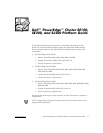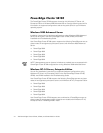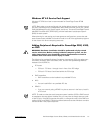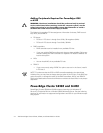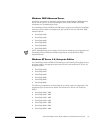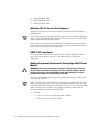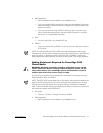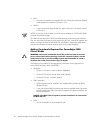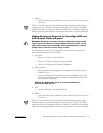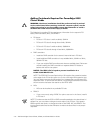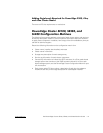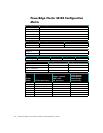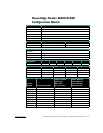
1-10 Dell PowerEdge Cluster SE100, SE200, and SL200 Platform Guide
!"#$-&
!
$%&'
()"
*
#
The following list provides PCI slot assignment information for the system’s PCI
buses, RAID controllers, NICs, and DRAC 2.
PCI buses
— PCI bus 1: PCI slots 1 and 2 are 64-bit, 33-MHz
— PCI bus 2: PCI slots 3 through 6 are 64-bit, 33-MHz
— PCI bus 3: PCI slots 7 and 8 are 64-bit, 33/66-MHz
— PCI bus 4: PCI slots 9 through 10 are 64-bit, 33/66-MHz
RAID controllers
— Install the RAID controller for the server’s internal drives in PCI slot 1.
— Install additional RAID controllers in any available 64-bit, 33-MHz or 32-bit,
33-MHz PCI slot.
— If you use multiple RAID controllers and there are available slots, Dell recom-
mends installing the RAID controllers on separate 64-bit PCI buses to
balance the load on the system.
*%+,-)
./011,..2'!*
NOTE: The PERC 2/DC comes fitted with an ISA retainer (the extension bracket
at the edge of the PCI card) to allow it to fit into a full-length ISA expansion slot.
You may need to remove the ISA retainer from systems that use full-length PCI
expansion slots. To remove the ISA retainer, use a Phillips screwdriver to remove
the two screws that fasten the retainer to the PERC 2/DC.
NICs
— NICs can be installed in any available PCI slot.
DRAC 2
— If you are currently using a DRAC 2 or plan to use one in the future, install it
in PCI slot 2.
NOTE: To make sure that the SCSI or RAID controller attached to the boot drives ini-
tializes first, you may have to change the scan order of the PCI bus, if the system
BIOS supports this option, or change the order of the RAID, NIC, and DRAC 2. Per-
forming these tasks ensures that Windows numbers the boot drives in the proper
sequence.





